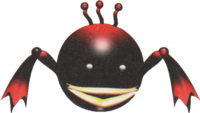ComBat: Difference between revisions
From the Super Mario Wiki, the Mario encyclopedia
Jump to navigationJump to search
Somethingone (talk | contribs) (Lo and behold ComBats are, in fact, bats.) Tag: Mobile edit |
m (Text replacement - "{{[Ss]pecies-infobox" to "{{species infobox") |
||
| Line 1: | Line 1: | ||
{{ | {{species infobox | ||
|image=[[File:ComBatYSArtwork.png|200px]]<br>A ComBat from ''Yoshi's Story'' | |image=[[File:ComBatYSArtwork.png|200px]]<br>A ComBat from ''Yoshi's Story'' | ||
|first_appearance=''[[Yoshi's Story]]'' ([[List of games by date#1997|1997]]) | |first_appearance=''[[Yoshi's Story]]'' ([[List of games by date#1997|1997]]) | ||
Revision as of 21:39, April 20, 2022
| ComBat | |
|---|---|
 A ComBat from Yoshi's Story | |
| First appearance | Yoshi's Story (1997) |
ComBats[1], also known as Bats[2], are a species of bat[3] that appear in Yoshi's Story. They may be found in the stages The Tall Tower, Piranha Grove, Neuron Jungle, Lift Castle, and Magma Castle. ComBats will attack any Baby Yoshi that gets too close and are immune to most things other than eggs.
ComBats are black, spherical bats with red wings, as well as antennas. It has three antennae on the top of its head. They also have small limbs that connect their hands with their body, and yellowish lips with two small white eyes.
Profiles and statistics
- Shogakukan guide: 「踏めない、食えないとくれば、夕マゴでポン!」 ("If you can't stomp or eat it, pop it with an egg!")[4]
Gallery
Names in other languages
| Language | Name | Meaning |
|---|---|---|
| Japanese | アセカキくん[4] Asekaki-kun |
From「汗かき」(asekaki, an adjective for "sweating easily") and「くん」(-kun) |
References
- ^ Leung, Jason, Terry Munson, and Scott Pelland. Yoshi's Story Player's Guide. Page 11.
- ^ Prima Bath. Nintendo 64 Game Secrets, 1999 Edition Prima's Official Strategy Guide. Page 115.
- ^ Yoshi's Story Player's Guide, page 126: "Inside the room is a ComBat battalion. Since the bats often fly close to one another, you'll be able to shoot down more than one with the same shot."
- ^ a b 「ヨッシーストーリー 任天堂公式ガイドブック」 (Yoshi's Story Nintendo Kōshiki Guidebook), page 6.